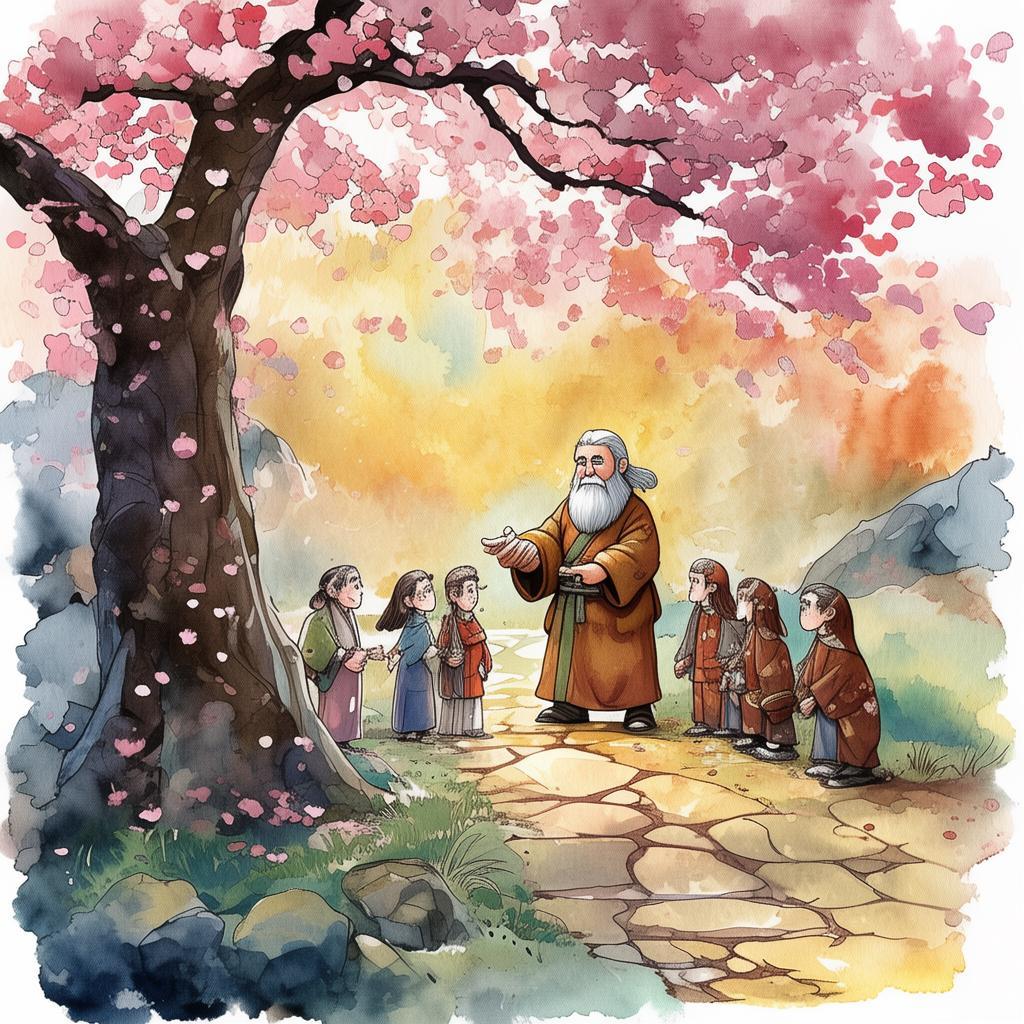The Zen Monk's Garden of Wealth and Wisdom
In the heart of ancient Kyoto, there lay a serene Zen garden, a place where the sound of flowing water and rustling leaves whispered secrets of the universe. The garden belonged to a misanthropic monk named Kaito, who had renounced the world to seek truth and enlightenment. Kaito was a man of few words and fewer desires, his life a stark contrast to the opulence that surrounded him in the bustling city.
The garden was his sanctuary, a place where he meditated and pondered the mysteries of life. It was a place of great beauty, with meticulously crafted stone paths, an array of vibrant plants, and an ancient stone lantern that flickered softly at night. Yet, despite its splendor, Kaito felt a void within him, a yearning for something more than the quietude of his garden.
One day, as Kaito was tending to the garden, he noticed a peculiar stone that had been overlooked. It was unlike the others, rough and unpolished, lying in the shadow of a majestic pine tree. Intrigued, he picked it up and examined it closely. There, etched into the stone, were the characters for the Chinese proverb, "The wealth of the mind is the true wealth."
Kaito's mind raced with questions. He had always believed that wealth was a byproduct of material possessions, but this stone seemed to suggest otherwise. Determined to uncover the truth, he began to research the proverb, seeking out ancient texts and seeking guidance from fellow monks.
As he delved deeper into his studies, Kaito discovered that the proverb spoke of a deeper truth: the true wealth of a person lay not in their possessions, but in their wisdom, compassion, and inner peace. It was a revelation that shook him to his core, challenging his long-held beliefs.
Determined to test the proverb's validity, Kaito decided to embark on a journey of self-discovery. He would leave his garden and venture into the world, seeking out those who had found true wealth in their lives. His first stop was a bustling marketplace, where he encountered a wealthy merchant.
"Master Kaito, why have you come here?" the merchant asked, his eyes reflecting the glint of gold coins.
"I seek to understand the nature of true wealth," Kaito replied, his voice steady.

The merchant chuckled, "True wealth is measured in gold and silver, in land and property. It is the accumulation of material goods that brings happiness."
Kaito listened intently, but his heart remained unchanged. He continued his journey, visiting temples, monasteries, and even the homes of the poor, seeking answers. Each person he met shared their own understanding of wealth, but none of them seemed to grasp the true essence of the proverb.
Disheartened, Kaito returned to his garden, feeling more lost than ever. He sat beneath the pine tree, pondering the stone's words, when he noticed something unusual. The rough stone had begun to change, its surface becoming smoother and more reflective with each passing day.
One evening, as the sun dipped below the horizon, the stone transformed completely, revealing a mirror-like surface. Kaito looked into the mirror and saw not only his own reflection, but the reflection of the world around him. He saw the merchant's greed, the monk's pride, and the beggar's despair. In that moment, he understood the true meaning of the proverb.
The wealth of the mind is the true wealth, Kaito realized. It is the clarity of thought, the depth of compassion, and the peace that comes from within. He understood that the garden he had cultivated was a metaphor for the inner garden of the mind, a place where one could find true wealth and wisdom.
With newfound clarity, Kaito returned to the marketplace, this time not as a seeker, but as a teacher. He shared his discovery with the merchant, the monk, and the beggar, explaining that true wealth was not about material possessions, but about the richness of the soul.
The merchant, touched by Kaito's wisdom, decided to give away his wealth, using it to help others. The monk, humbled by Kaito's insight, sought to cultivate his own inner garden. And the beggar, inspired by Kaito's compassion, found strength within himself to overcome his struggles.
Kaito's journey had changed not only his own life but the lives of those around him. He had discovered that the true wealth of the mind was the foundation upon which true wisdom and happiness were built.
In the years that followed, Kaito's garden became a place of enlightenment, a sanctuary for those seeking the true meaning of life. And the misanthropic monk, once a man of few words, found that his heart was full of wisdom and compassion, a testament to the profound truth etched into the stone of his Zen garden.
✨ Original Statement ✨
All articles published on this website (including but not limited to text, images, videos, and other content) are original or authorized for reposting and are protected by relevant laws. Without the explicit written permission of this website, no individual or organization may copy, modify, repost, or use the content for commercial purposes.
If you need to quote or cooperate, please contact this site for authorization. We reserve the right to pursue legal responsibility for any unauthorized use.
Hereby declared.









